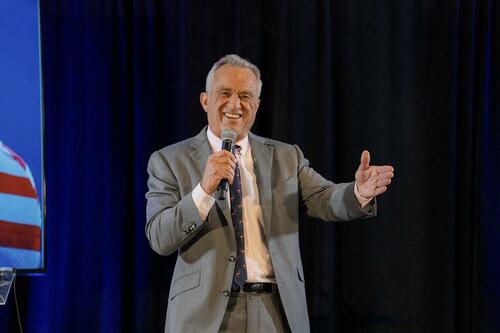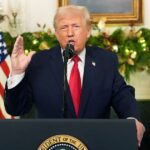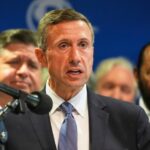
Authored by Philip Wegmann via RealClearPolitics,
Since Election Day, the Trump transition has been copying and pasting the same quote again and again into emails to reporters seeking comment on this or that presidential appointment.
“President-Elect Trump will begin making decisions on who will serve in his second Administration soon,” Trump transition spokesperson Karoline Leavitt always writes without fail. “Those decisions will be announced when they are made.”
The boilerplate delivers an obvious truth that many in Washington, D.C., find uncomfortable or, in some cases, unimaginable: The president-elect alone, not his senior staff, and certainly not any outside organization, is calling the shots.
Enter Robert F. Kennedy Jr.
The famous vaccine skeptic is a new addition to the Trump orbit. He abandoned his own presidential campaign over the summer before backing the Republican candidate, delivering an unusual but no less invaluable endorsement in the final stretch of the election season. “It is a realignment,” Tucker Carlson later said of the coalition that included RFK Jr., whose addition he helped facilitate. “It is unbelievable.” The Kennedy apostate, it seemed at the time, was only there to deliver a bit of political capital.
Kennedy is an environmental lawyer who believes in climate change and who sued oil companies. He is a Catholic but also a liberal who believes in abortion rights. He is a crusader against what he has described as “Big Banks” and “Big Data” and “Big Tech” and “Big Pharma.”
The one thing Kennedy would never be? The Health and Human Services Secretary. So said Howard Lutnick, the co-chair of the Trump transition committee. Just days before the election, he told CNN that Kennedy was “not getting a job for HHS.” Asked anchor Kaitlin Collins, “He would not be in charge of HHS?” Replied Lutnick, “No, of course not.”
And then, nine days after the election, Trump announced his intent to nominate RFK Jr. to that HHS post.
“I look forward to working with the more than 80,000 employees at HHS to free the agencies from the smothering cloud of corporate capture so they can pursue their mission to make Americans once again the healthiest people on Earth,” Kennedy said in a statement.
Pharmaceutical stocks stumbled. Democrats on Capitol Hill were aghast. Republicans were mostly silent. Asked for reaction, South Dakota Sen. John Thune, whom Republicans elected to serve as Senate majority leader in the next Congress, told reporters, “I don’t have one at this point.”
Not all of Trump’s picks were so controversial. Florida Sen. Marco Rubio, for instance, is well-respected among his colleagues on the Hill and is considered a shoo-in for secretary of state. Others reflected the realignment that Carlson referenced on the campaign trail, like former Hawaii Rep. Tulsi Gabbard, a lapsed Democrat whom Trump tapped to serve as his director of national intelligence.
And then there is former Rep. Matt Gaetz. RealClearPolitics first reported that the Florida Republican was about to resign after Trump announced his intent to nominate him to be attorney general. His hasty resignation likely precludes the House Ethics Committee from releasing a report that includes allegations he had sex with a minor. Gaetz denies the allegations. Some Republicans still find them disqualifying.
Trump made the decision, according to Politico, after his longtime confidant Boris Epshteyn lobbied on Gaetz’s behalf the night before. Incoming White House chief of staff Susie Wiles was reportedly unaware and in a different part of the plane during the deal-making.
The developments reflect a president-elect who is much more hands-on this time around and, perhaps, a transition chief unaware of how Trump operates.
“Lutnick doesn’t understand the pre-election transition was just a placeholder,” said one former White House official in close contact with the transition team. “He’s not even remotely in charge anymore, his role was to warm up the lists, then Trump and team add and make real decisions.”
“Did he think he was picking the Cabinet?” the Trump World source quipped to RealClearPolitics. “Maybe he forgot who won 312 electoral votes.”
Lutnick had also proclaimed during the campaign that anyone affiliated with the Heritage Foundation’s Project 2025 was “radioactive.” But numerous individuals with Project 2025 on their resumes have been tapped for key posts (Tom Homan was named “border czar”) or are even helping to lead the transition (John Ratcliffe is involved in the national security teams).
A White House transition is a daunting undertaking for any president-elect. Beyond just the Cabinet, thousands of mid and lower-level positions across the government must be filled. Advisers close to the president-elect say that Trump relies on the advice and counsel of Wiles and Lutnick. No longer a political novice, though, like he was the last time, he is making the final calls.
“We are not the candidate. We are not the president. It is his campaign, his election, and his presidency,” the former White House aide explained. “We can only help if asked. Decisions are all his.”
The product of those decisions? A Cabinet lineup that reflects the realignment that Trump promised, even if it isn’t the one that Washington would prefer. At Mar-a-Lago, his Palm Beach residence, Trump reveled in his heterodox picks.
At a gala celebrating the anniversary of the America First Policy Institute, a think tank staffed with loyalists, he pointed to RFK Jr. in the crowd before vowing that his HHS nominee would “do some unbelievable things that no one else could accomplish.”
It seemed until recently that no one else besides Trump could imagine RFK Jr. in that role. It was his decision alone.
Authored by Philip Wegmann via RealClearPolitics,
Since Election Day, the Trump transition has been copying and pasting the same quote again and again into emails to reporters seeking comment on this or that presidential appointment.
“President-Elect Trump will begin making decisions on who will serve in his second Administration soon,” Trump transition spokesperson Karoline Leavitt always writes without fail. “Those decisions will be announced when they are made.”
The boilerplate delivers an obvious truth that many in Washington, D.C., find uncomfortable or, in some cases, unimaginable: The president-elect alone, not his senior staff, and certainly not any outside organization, is calling the shots.
Enter Robert F. Kennedy Jr.
The famous vaccine skeptic is a new addition to the Trump orbit. He abandoned his own presidential campaign over the summer before backing the Republican candidate, delivering an unusual but no less invaluable endorsement in the final stretch of the election season. “It is a realignment,” Tucker Carlson later said of the coalition that included RFK Jr., whose addition he helped facilitate. “It is unbelievable.” The Kennedy apostate, it seemed at the time, was only there to deliver a bit of political capital.
Kennedy is an environmental lawyer who believes in climate change and who sued oil companies. He is a Catholic but also a liberal who believes in abortion rights. He is a crusader against what he has described as “Big Banks” and “Big Data” and “Big Tech” and “Big Pharma.”
The one thing Kennedy would never be? The Health and Human Services Secretary. So said Howard Lutnick, the co-chair of the Trump transition committee. Just days before the election, he told CNN that Kennedy was “not getting a job for HHS.” Asked anchor Kaitlin Collins, “He would not be in charge of HHS?” Replied Lutnick, “No, of course not.”
And then, nine days after the election, Trump announced his intent to nominate RFK Jr. to that HHS post.
“I look forward to working with the more than 80,000 employees at HHS to free the agencies from the smothering cloud of corporate capture so they can pursue their mission to make Americans once again the healthiest people on Earth,” Kennedy said in a statement.
Pharmaceutical stocks stumbled. Democrats on Capitol Hill were aghast. Republicans were mostly silent. Asked for reaction, South Dakota Sen. John Thune, whom Republicans elected to serve as Senate majority leader in the next Congress, told reporters, “I don’t have one at this point.”
Not all of Trump’s picks were so controversial. Florida Sen. Marco Rubio, for instance, is well-respected among his colleagues on the Hill and is considered a shoo-in for secretary of state. Others reflected the realignment that Carlson referenced on the campaign trail, like former Hawaii Rep. Tulsi Gabbard, a lapsed Democrat whom Trump tapped to serve as his director of national intelligence.
And then there is former Rep. Matt Gaetz. RealClearPolitics first reported that the Florida Republican was about to resign after Trump announced his intent to nominate him to be attorney general. His hasty resignation likely precludes the House Ethics Committee from releasing a report that includes allegations he had sex with a minor. Gaetz denies the allegations. Some Republicans still find them disqualifying.
Trump made the decision, according to Politico, after his longtime confidant Boris Epshteyn lobbied on Gaetz’s behalf the night before. Incoming White House chief of staff Susie Wiles was reportedly unaware and in a different part of the plane during the deal-making.
The developments reflect a president-elect who is much more hands-on this time around and, perhaps, a transition chief unaware of how Trump operates.
“Lutnick doesn’t understand the pre-election transition was just a placeholder,” said one former White House official in close contact with the transition team. “He’s not even remotely in charge anymore, his role was to warm up the lists, then Trump and team add and make real decisions.”
“Did he think he was picking the Cabinet?” the Trump World source quipped to RealClearPolitics. “Maybe he forgot who won 312 electoral votes.”
Lutnick had also proclaimed during the campaign that anyone affiliated with the Heritage Foundation’s Project 2025 was “radioactive.” But numerous individuals with Project 2025 on their resumes have been tapped for key posts (Tom Homan was named “border czar”) or are even helping to lead the transition (John Ratcliffe is involved in the national security teams).
A White House transition is a daunting undertaking for any president-elect. Beyond just the Cabinet, thousands of mid and lower-level positions across the government must be filled. Advisers close to the president-elect say that Trump relies on the advice and counsel of Wiles and Lutnick. No longer a political novice, though, like he was the last time, he is making the final calls.
“We are not the candidate. We are not the president. It is his campaign, his election, and his presidency,” the former White House aide explained. “We can only help if asked. Decisions are all his.”
The product of those decisions? A Cabinet lineup that reflects the realignment that Trump promised, even if it isn’t the one that Washington would prefer. At Mar-a-Lago, his Palm Beach residence, Trump reveled in his heterodox picks.
At a gala celebrating the anniversary of the America First Policy Institute, a think tank staffed with loyalists, he pointed to RFK Jr. in the crowd before vowing that his HHS nominee would “do some unbelievable things that no one else could accomplish.”
It seemed until recently that no one else besides Trump could imagine RFK Jr. in that role. It was his decision alone.
Loading…





